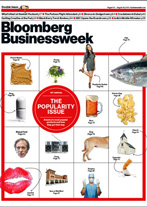business isn’t a popularity contest
Bloomberg BusinessWeek’s publication of its “The Popularity Issue: America’s most popular products and how they got that way” makes some fascinating statements about today’s business culture — but not because of the items it named (although those do make for an interesting read.)

The fact that a business publication would devote an issue to things which are “popular” and that it plans to do this every year (as this issue was named its “1st Annual”) suggests that popularity is a concept businesspeople care about – which is an interesting, and not necessarily good, development. Further, the methods by which BusinessWeek measures so-called popularity reveal the vagary in any undertaking to understand popularity – which leads to some important implications about business success.
First, some context. The TOC of the issue features the following subhead: “A guide to America’s favorite stuff: the food we eat, the sneakers we wear, the churches we visit, the colors of cars we drive. Not the coolest or best – just the ubiquitous, omnipresent No. 1s.” (emphasis mine)
And the piece itself ends with, “Our mission here is not to judge but to use the best available methodology—it varies widely from item to item—to determine the winners of the never-ending popularity contest that is the American economy. Your taste may differ. In fact, we’re sure it does.”
So it seems the BusinessWeek people define popularity by breadth – that is, the most popular items are the ones with the broadest awareness or penetration. Most of their metrics support this – they use unit sales to name the most popular brands of cereal, sneakers, underwear, sports cars and more – and share of traffic indicates the most popular airport, vacation spot, and church.
But the problem is breadth of awareness or penetration is not an indicator of appeal or affection. To understand this, we have to look no further than a story which ran as a sidebar in the BusinessWeek piece – it chronicled the unlikely rise to stardom of Olivia Munn, the co-host of G4’s Attack of the Show!
Despite her better-than-average looks, Munn was a somewhat unremarkable figure until she joined the show and flamed her sex appeal among its geek fans by assuming the personas of sexy, domineering female characters with a goofy sense of humor – she’s now ranked No. 8 in this year’s Maxim magazine’s list of hottest women. Munn herself admits, “Popular doesn’t mean people like you. Popular just means that people know who you are. In the end, it could all go away.”
Clearly broad “popularity” is tenuous and not the best aspiration for companies. Just because people know you and buy you doesn’t mean they like you.
It’s more appropriate to align with dictionary definition of popularity: regarded with favor, approval, or affection by people in general (popular. (n.d.). Dictionary.com Unabridged. Retrieved August 13, 2010, from Dictionary.com website) We should stay true to the root meaning of word which is borrowed from the Latin popularis in 1490, originally meant common or “belonging to the people“. (Etymology Online entry for Popular, April 05, 2009.)
Dollar sales is a slightly better indicator of popularity, then. By factoring in the price people pay for products, we get a better indication of their affection for them. The BusinessWeek piece does indeed use this measure to report on the popularity of deodorant, soda, lipstick, and alcohol brands.
But I would argue that even dollar sales isn’t the most accurate read on what’s hot and what’s not. Distribution dominance, an underdeveloped category, or strong advertising and promotion can generate more sales at a higher price point for a brand which is not necessarily preferred.
Companies are better off measuring esteem. Wikipedia states, “Popularity is the quality of being well-liked or common, or having a high social status.” If we truly want to understand popularity, we need to measure how people think and feel, not simply what they buy. Do they hold the brand in high regard? Do they prefer it?
In the end, though, I question whether popularity is really the right goal for many brands. If you’re competing in a mass market category and have the resources (distribution power, ad and promo dollars, etc.), then aspiring to win the hearts of as many people as possible makes sense. More power to ya, Coke, McDonald’s, and Ford!
But the reality is most companies don’t have these resources – and actually, they don’t need to. Especially in today’s new media environment, companies can reach specific targets and stimulate purchase and cultivate strong affect among those discrete groups. These brands might be less popular but they’re no less powerful when it comes to generating sales volume, staving off competitive threats, and commanding a price premium.
Plus generally speaking it’s easier and more efficient to go deep vs. broad. And given the fickleness of our fad-driven culture, stronger, more focused appeal is more sustainable than broad awareness.
This counters much of the prevailing wisdom in business these days. Most companies seem to be fixated on generating buzz – they want to get as many people talking about their products as they can. There’s no such thing as bad buzz, it seems. But awareness and conversation don’t build a brand – strong attachment and affection does.
It would have been far more instructive for BusinessWeek to have run a “Most Loved” issue, but then, perhaps it wouldn’t have been as popular!